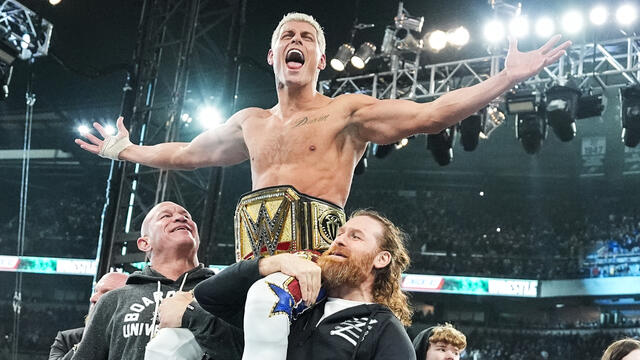
The significance of being champion
Glory and fame. A fatter paycheck. First-class air travel. Constant toil. Endless media appearances. A huge bull's-eye on the back.
Welcome to life as a champion in WWE. It's a blessing, and just as often, it’s a curse.
Amid the power grabs, deep-seated rivalries and sneaky ambushes that play out in WWE weekly, it is easy to sometimes lose sight of why Superstars compete in the first place: to become champion. It is for that reason that Night of Champions — the one night of the year when the WWE Universe is guaranteed to see every title put on the line — is a uniquely important event on WWE's pay-per-view calendar.
Titles have changed hands 13 times in the five pay-per-views that have been branded Night of Champions, including 2007's Vengeance, which was subtitled "Night of Champions.” Each event saw at least one title change hands, suggesting at least one of the challengers will leave Boston this Sunday with newfound championship gold. But what, exactly, is the significance of being champion?
A title win serves as the reward for years of training and hard work. Every wrestler remembers his or her first championship win, regardless of whether it happened under the bright lights of WWE or the flickering fluorescents of the independent circuit. It is a moment that comes with a sense of pride, always.
"That feeling is something that will stick with me forever," SmackDown General Manager Booker T said of a night in 1992 when he and brother Stevie Ray won the tag team championships of the Dallas-based Global Wrestling Federation. The brothers' family in attendance was proud of Booker and Stevie Ray "breaking out and becoming something," he told WWE.com.
The GWF Tag Team Titles, of course, were only the first of many eventual titles that Booker T, a former World Heavyweight Champion and a five-time WCW Champion, would go on to hold.
Everybody has the same goal, and they're after what's around your waist.Former United States Champion Fit Finlay thought he had "made it" when he won his first championship in Europe at age 19. But as soon as the glow of the title victory began to fade, the realization that he had instantly become a target sunk in. Now a producer with WWE, Finlay concluded to WWE.com that his first title victory “wasn’t as happy a moment as I thought it’d be,” given the new pressure that comes with being a champion.
That pit-of-the-stomach sensation may resonate with another European Superstar, current U.S. Champion Antonio Cesaro. At Night of Champions, Cesaro will make his first pay-per-view title defense, taking on the winner of a Battle Royal that will be held earlier in the night during the free, live-streamed online Pre-Show. Cesaro has already experienced the thrill of winning his first title in WWE; now he moves on to the even harder part: keeping the U.S. Championship.
Fly-by-night champions come and go, observes Finlay, a ring veteran of more than three decades. No matter the championship or the division, a titleholder needs to be on his or her A-game 365 days a year, he said, putting into perspective accomplishments such as Punk’s remarkable 300-plus day WWE Title reign.
“Everybody has the same goal, and they’re all after what you’ve got around your waist,” Finlay said. “You need to be in top form.”
There are other downsides to being a champion. Toting a gold-and-leather title through airport security can quickly become a tiresome chore. Media appearances, though essential in the eyes of management, only pile onto Superstars’ already packed itineraries.
“It’s a never-ending story when you become champ,” Booker T said. “I’ve always said, be careful what you wish for, because being a World Champion is actually the hardest job in WWE.”
Pecking order
Two weeks ago on Raw, CM Punk referenced a "pecking order" in WWE. While declaring his title to be the ne plus ultra of sports-entertainment, The Second City Saint told Sheamus that holding the World Heavyweight Championship makes The Celtic Warrior No. 2, at best. Regardless of Punk’s bold assertion, there is no denying that the two World Titles stand out above the other championships.
Apart from those titles, however, there are still four other championship scenes, each with a full line of contenders — both real and wannabe — champing at the bit to get their taste of championship gold.
Winning a title indicates superiority over a class of competitors, and it is also a sign of advancement. Without secondary and tertiary singles titles, such as the Intercontinental and United States Championships, it would be that much more difficult to establish a hierarchy within the WWE locker room. Too often, the import of a secondary titleholder is overlooked. Superstars use those championships as measuring sticks to chart their growth as competitors.
"If you become World Champion or United States Champion or Intercontinental Champion — whatever that title may be — it is a progression of your inner self, your inner strength [and] the ability to overcome obstacles," Finlay said.
Besides being considered one of the hardest-working champions in the mat game (Superstars such as Shawn Michaels have referred to the Intercontinental Title as the locker room workhorses’ title), the Intercontinental Champion has long been considered the presumptive top contender to the WWE Champion. It was as the reigning Intercontinental Champion that Ultimate Warrior won the WWE Title in 1990. In total, 17 Superstars who have held the Intercontinental Championship have gone on to win a WWE Championship later in their career.
Holding the Intercontinental Title positions a Superstar to be next in line for a WWE Title or World Heavyweight Title opportunity, according to WWE Producer Road Dogg, a former Intercontinental Champion and five-time World Tag Team Champion.
"It definitely puts you on the next rung right under the World Champion," he said. Though he considers his run with the now-defunct Hardcore Championship to be his favorite title reign and he modestly suggests his ring work was not up to par with his Intercontinental Champion predecessors, Road Dogg points out that his 14-day Intercontinental Championship was especially meaningful because it was a singular accomplishment.
That is not to discount the significance of winning a championship as one-half of a tag team. The requirements to be a successful tag team wrestler are unique. To excel in tag team competition, Superstars must be able to work with their partner and rely on somebody else’s performance, “rather than relying on yourself,” Finlay added.
The Belfast Bruiser’s insight begs the question: Can Kane & Daniel Bryan, the No.1 contenders to WWE Tag Team Champions R-Truth & Kofi Kingston, get on the same page long enough to become champions?
Tandem accomplishment or not, winning the World Tag Team Title for the first time was the cause for much celebration for Road Dogg in 1997. Much to the chagrin of New Age Outlaw partner Billy Gunn, Road Dogg was so proud of the win that he wore his Tag Team Title while walking through the airport in Atlanta. He never passed up an opportunity to boast about his championship gold because, as he put it, “It was symbolic of, ‘Hey, you’re the best tag team going right now,’ and it hit me in my heart."
"I propped [the title] up in the back of the car as we traveled so all the other wrestlers would see it," Road Dogg confessed. “I had a bit of fun at everybody else’s expense.”
Holding a championship comes with no shortage of perils, but it also has its perks. The pay is better and the flight seating is cushier, Road Dogg explained.
More than anything else, being champion makes the long hours on the road and in the gym all worthwhile.
"After all the hard work that guys and girls put into achieving and striving to get somewhere, and now you've got a badge to put on you, you are the champion — it's a great payoff," Finlay said. "You've made it, you’ve set your sights, you've gone for it and you’ve achieved it.”
Additionally, to even have the chance to vie for a championship shows that the powers-that-be in WWE believe a Superstar has earned his or her keep. Matchmakers and General Managers do not hand out title opportunities generously. To put someone in that position is a vote of confidence. Describing his 1978 WWE Title win as the day his “whole life changed,” Bob Backlund recently told WWE.com that not a day goes by that he does not reflect gratefully on Vincent J. McMahon’s (father of now-WWE Chairman Vincent K. McMahon) decision to give him a crack at the top prize in the sport.
Booker T can relate to Mr. Backlund.
“The World Championship is the pinnacle in the business,” Booker T said. “To be the guy that the company goes to as far as trust and confidence in your ability to represent the company — that means a whole lot.
“To know exactly what it took to go through the trenches, go through all the wars and then to finally make it let me know that hard work does pay off,” he added.
WWE Shows Latest Results
Raw results, April 15, 2024: Chad Gable viciously attacks Sami Zayn after losing to Zayn in Intercontinental Title Match!
Full ResultsSmackDown results, April 12, 2024: LA Knight and AJ Styles earn victories for a chance to challenge Cody Rhodes at WWE Backlash!
Full ResultsWWE NXT results, April 16, 2024: Trick Williams defeats Carmelo Hayes in a Steel Cage Match
Full Results















